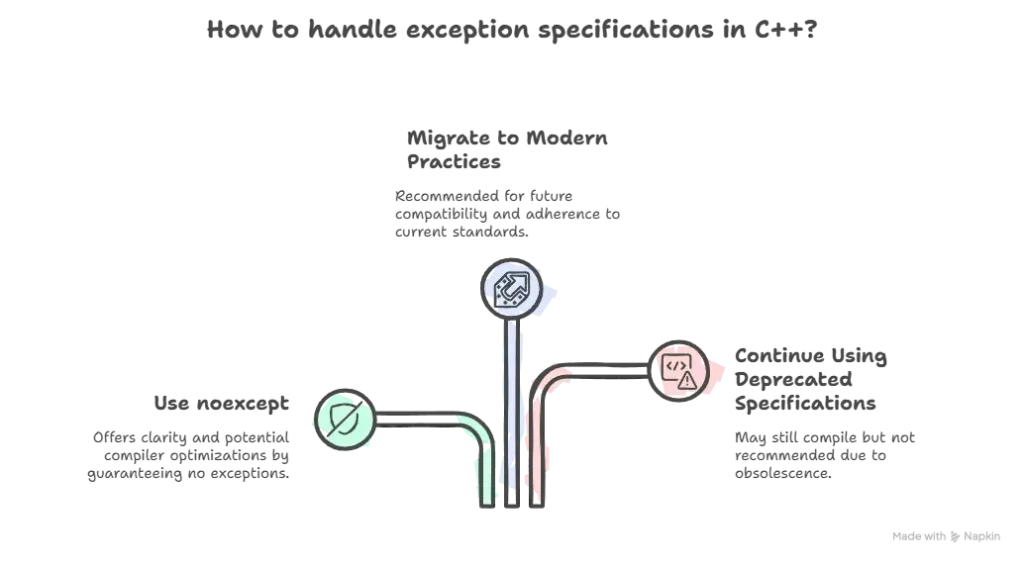Exception handling is a fundamental mechanism in C++ for managing errors and unexpected situations that might arise during program execution. While exception handling itself is a vast topic, this chapter delves specifically into exception specifications. These specifications were a feature of C++ up to version 17 but have since been deprecated due to limitations and complexities. However, understanding them can provide valuable historical context and a deeper appreciation for modern exception handling practices.
Exceptions: Catching Errors Gracefully
Imagine a complex recipe with multiple steps. If an ingredient is missing or a step goes wrong, you wouldn’t want the entire cooking process to fail. Exceptions in C++ work similarly. They allow you to isolate and handle specific errors without crashing the whole program. Exceptions are objects thrown by code to signal an error condition.
The Try-Catch Block: The Core of Exception Handling
The try-catch block is the cornerstone of exception handling. The try block contains the code that might throw an exception. The catch block specifies how to handle the exception if it occurs within the try block.
#include <iostream>
#include <stdexcept>
// Function to perform division
int divide(int dividend, int divisor) {
if (divisor == 0) {
throw std::runtime_error("Division by zero");
}
return dividend / divisor;
}
void someFunction() {
try {
// Code that might throw an exception
int result = divide(10, 0); // Intentionally causing division by zero exception
std::cout << "Result: " << result << std::endl;
} catch (const std::exception& e) {
std::cerr << "Error: " << e.what() << std::endl;
}
}
int main() {
someFunction();
return 0;
}
Explanation:
- The
someFunctionattempts to divide 10 by 0, which throws astd::division_by_zeroexception. - The
catchblock catches any exception of typestd::exception(or a derived type) and prints an error message usinge.what(). - This prevents the program from crashing due to the exception.
Introducing Exception Specifications (Deprecated in C++17)
What Were Exception Specifications?
Exception specifications were an optional feature in C++ that allowed you to declare the types of exceptions a function might throw. This information could be used by the compiler for various purposes, such as:
- Static type checking: The compiler could verify if the function calls within a
tryblock were compatible with the exception specifications of the called functions. - Code optimization: The compiler might generate more efficient code based on the known exception possibilities.
Syntax of Exception Specifications
Exception specifications were written after the function parameter list and enclosed in parentheses. Here’s the basic syntax:
return_type function_name(parameter_list) throw(exception_type_list);
exception_type_list: A comma-separated list of exception types (e.g., throw(std::exception)) or throw() indicating no exceptions.
Why Were Exception Specifications Deprecated?
While exception specifications offered some potential benefits, they also had limitations:
- Brittle error handling: If a function threw an exception not specified in its exception specification, the program’s behavior became undefined, often leading to crashes.
- Runtime cost: Checking exception specifications at runtime added overhead.
- Limited use cases: Modern exception handling practices with RAII (Resource Acquisition Is Initialization) and smart pointers often make exception specifications unnecessary.
Understanding the Deprecation (Important for Historical Context)
The C++11 and C++14 Evolution
C++11 and C++14 introduced features like noexcept that offered a simpler and more reliable way to specify whether a function could throw exceptions. The noexcept specifier indicated that a function wouldn’t throw exceptions, improving code clarity and potentially enabling compiler optimizations.
int safe_function() noexcept {
// Code that is guaranteed not to throw exceptions
return 42;
}
The Final Farewell in C++17
With the introduction of noexcept and the limitations of exception specifications becoming more apparent, the C++17 standard officially deprecated exception specifications. While existing code using them might still compile, it’s recommended to migrate to modern exception handling practices.

Modern Exception Handling in C++
Exception Handling Without Exception Specifications
Modern C++ exception handling relies on techniques like:
try-catchblocks: As explained earlier, these blocks are the foundation for handling exceptions.- RAII (Resource Acquisition Is Initialization): This approach ensures proper resource management (like memory or files) through automatic acquisition and release during object lifetime. If resource acquisition fails, an exception is thrown. This simplifies exception handling and reduces the need for explicit specifications.
- Smart pointers: These manage memory allocation and deallocation automatically, throwing exceptions on allocation failures. This eliminates manual memory management and potential memory-related exceptions.
// RAII example with a custom resource class
class Resource {
public:
Resource() {
// Acquire resources (might throw an exception)
}
~Resource() {
// Release resources
}
};
void someFunction() {
try {
Resource resource; // RAII automatically acquires and releases the resource
// Do something with the resource
} catch (const std::exception& e) {
// Handle exception
}
}
noexcept Specifier (Optional but Useful)
While exception specifications are deprecated, the noexcept specifier remains a valuable tool. It informs the compiler that a function won’t throw exceptions. This can enable compiler optimizations and improve code clarity.
int add(int a, int b) noexcept {
return a + b;
}
Benefits of Modern Exception Handling
- Less brittle: Modern practices avoid the pitfalls of strict exception specifications, leading to more robust code.
- Improved code clarity: Exception handling logic becomes more explicit and easier to understand.
- Potential for better performance: The compiler can make informed optimizations based on exception throwing behavior.
Exception specifications, though a part of C++ history, have been superseded by more reliable and flexible approaches. By embracing modern exception handling techniques like try-catch blocks, RAII, smart pointers, and the optional noexcept specifier, you can write well-structured and robust C++ programs that effectively manage errors and unexpected situations.Happy coding !❤️
